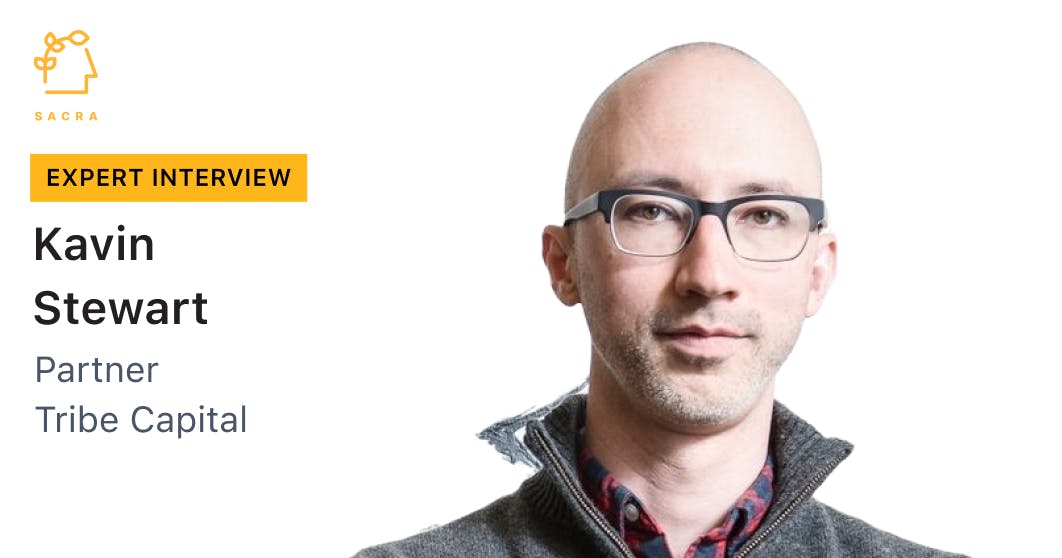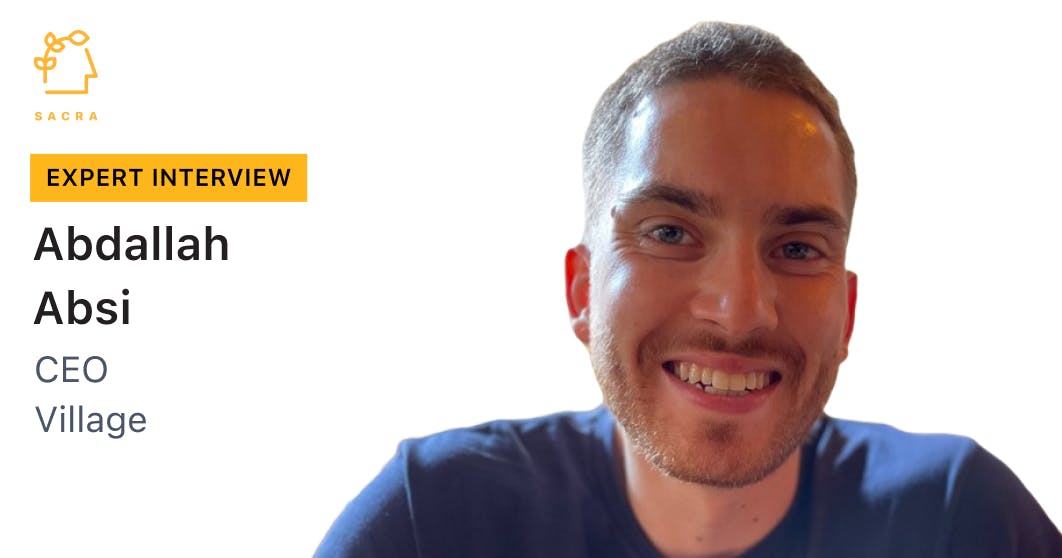Kavin Stewart, Partner at Tribe Capital, on Reddit's 10x opportunity
 Jan-Erik Asplund
Jan-Erik Asplund

Background
Kavin Stewart is partner at Tribe Capital and former VP of Product at Reddit. We talked to Kavin to learn more about the unit economics of on-demand services like Homejoy, monetization efforts at Reddit and the company's 10x opportunity, and the emerging ecosystem around LLM-based apps.
Questions
- You were VP of Product at Homejoy from 2013 to 2015. The dominant narrative on Homejoy’s shutdown was that it had negative unit economics (high CAC), high variability in service and infrequent, non-habitual service. Can you talk a little about what’s accurate about that narrative and what it gets wrong?
- We’ve seen on-demand companies from that era like Instacart (2012) and DoorDash (2013) go public, some like Postmates (2011) get acquired and others like Homejoy (2010) and Exec (2011) shut down. With the benefit of hindsight, can you talk about what you learned from seeing how those companies shook out and what Instacart and DoorDash did right in a big way?
- After Homejoy, you joined Reddit as VP of Product in 2016. Compared with contemporaries Facebook, Pinterest and Twitter, Reddit has grown relatively slowly, but today it’s the only one of them that’s not in decline. What’s different about Reddit and how it approaches growth such that it’s forged this unique growth trajectory?
- You joined Reddit shortly after co-founder Steve Huffman returned as CEO and reset the company’s focus on monetization, particularly through growing their ads business. Can you talk a bit about that inflection point in Reddit’s history?
- Reddit monetizes with ads and its subscription product Premium. How can Reddit grow ARPU from ~$1-2 to the $35-$45 of a Facebook or Instagram?
- From your perspective, do you see any major opportunities to drive more ARPU from their ads business versus how they're doing it today?
- In terms of the fundamental characteristics of Reddit, in 2023, what does it mean to be the front page of the internet? What do you think are the fundamental characteristics that do scale versus the ones that you have to shed along the way?
- If you were asked to make the 10x upside case for Reddit and they were going to go for broke, what do you think that would look like?
- You're now a partner at Tribe. What does it mean to build an AI-powered VC firm? What does it mean for how you operate? What tools do you use?
- How do you think about investing in AI? There’s a lot of anxiety from VCs about moats and where to invest. Do you invest in GPUs? Do you invest in the application layer? How do you see the landscape?
- You started your career as founder and CEO of Lolapps, a Facebook games developer. Because of the hypercompetitive app ecosystem and hypergrowth happening around the FB platform, FB games served as a petri dish for many of the adaptations and social mechanics that made their way into apps over the next decade. Something similar is happening with AI today. What interesting mechanics and adaptations in AI have your attention today?
Interview
You were VP of Product at Homejoy from 2013 to 2015. The dominant narrative on Homejoy’s shutdown was that it had negative unit economics (high CAC), high variability in service and infrequent, non-habitual service. Can you talk a little about what’s accurate about that narrative and what it gets wrong?
I would say it's largely an accurate description. Yes, we definitely failed as a company because our unit economics were not where they needed to be.
Infrequency of service was an issue in that we did a lot of one-off jobs that don't have good cLTV. Those bite-sized/single job opportunities with positive unit economics were hard to come by—our CAC payback cycle was longer than 1 job.
Cleaning is also something that's more limited in terms of its market—people who have a little money—and it also works best in places where you can have a kind of labor arbitrage.
To take all those things into account, it’s a tricky market—not to say it's impossible. What I would say is we were pioneers in a space— a space that not a lot of Silicon Valley companies had tried to tackle.
We got very schizophrenic advice from our board, to be frank, which made it very hard for us to focus internally on getting the unit economics right first.
We made a bunch of progress as a very growth-oriented company rolling out a bunch of cities, and I think there's a lot of expectations that you’re going to continue to expand or at least you're not going to contract.
If you want to solve these problems in the right way, you should actually just cut down your markets, redo the unit economics, make it work, and then go abroad. I think there was a lack of sophistication in terms of understanding how to approach these problems well, and then, a lack of an opinionated approach in terms of how to tackle those things.
We’ve seen on-demand companies from that era like Instacart (2012) and DoorDash (2013) go public, some like Postmates (2011) get acquired and others like Homejoy (2010) and Exec (2011) shut down. With the benefit of hindsight, can you talk about what you learned from seeing how those companies shook out and what Instacart and DoorDash did right in a big way?
It's probably not too different from what we already went through, where basically it's easier if you have a repeat business, and you live and die on unit economics. That’s the first thing you need to get right in order for a business to be viable.
The winners in the space were the smart ones who realized that early on and they were incredibly focused on getting really good unit economics.
The long term vision was to move to a model where you're providing a constant stream of services so that you can better project CAC payback, etc. Home cleaning on its own was hard because customers broke down into one-offs which were generally UE negative and sustained jobs where there was disintermediation risk.
Each home cleaning has a lot of idiosyncrasies, so there's a lot of high touch interactions between cleaner and customer. This leads to disintermediation opportunities AND a desire to disintermediate because you've already "onboarded" one person and you don't want the platform to switch them out for another.
After Homejoy, you joined Reddit as VP of Product in 2016. Compared with contemporaries Facebook, Pinterest and Twitter, Reddit has grown relatively slowly, but today it’s the only one of them that’s not in decline. What’s different about Reddit and how it approaches growth such that it’s forged this unique growth trajectory?
You really have to give credit to Steve Huffman, the original founder and CEO, as well as Alexis. Steve just had a really amazing focus on delivering a great user experience, even when that wasn't the thing that would grow the business most aggressively—but ultimately, I think that doing that has led to more sustainable growth.
I was running the growth team at the time, and there would be times where I would want to do something—like get people to sign for the mobile app, or put into place some of the slightly aggressive tactics that are pretty common at other companies.
Steve was always quite balanced about how he approached growth, and I think it’s through that instinct that he has really helped the company achieve sustainable growth that endures a lot longer.
You joined Reddit shortly after co-founder Steve Huffman returned as CEO and reset the company’s focus on monetization, particularly through growing their ads business. Can you talk a bit about that inflection point in Reddit’s history?
People at the time were really adamant that we weren’t going to be able to monetize. But that was a career breakout moment for me. I was like, "Duh, we can monetize. I use Reddit every day. It is clearly valuable. If you just look at the precedent of what Facebook and others have done, it’s incredibly obvious."
The problem was that Reddit was internally the most fucked up organization that I've ever seen. I remember there was an engineering manager who, when we got there, had spent three months of his time at work building a table. No, not a SQL table—like a physical table. He was doing carpentry. It was like, "Are we a business, or are we just some weird ass communist organization?" It felt like people thought they had the right to just be there and make a dime.
Just moving the culture from pure idiocy to having a standard culture of how you build products was the hardest part of the job. I think it's also the part that created the most upside there. Steve had a great vision for what he wanted to build. He introduced standard modernization strategies and growth strategies, and that's all we had to do. It wasn’t that hard.
That’s why I saw the opportunity, and I was just so excited, because while everyone thought Reddit was a loser, I thought it was an obvious winner, because it was still growing—just not very quickly at that time. Then we did a bunch of stuff like improve the SEO and onboarding and it grew even faster. It was like, "How is this not obvious to everyone?”
Reddit monetizes with ads and its subscription product Premium. How can Reddit grow ARPU from ~$1-2 to the $35-$45 of a Facebook or Instagram?
Well, I think it actually comes from different sources though. So, I believe all the targeting stuff is prevalent. I also worked in ads at Facebook. The real value comes from having insanely massive amounts of data.
I remember talking to one of my counterparts at Twitter. They had been trying to build a direct advertising business for a while, but it wasn't going as well as I had expected. I think when you scale it down, it doesn't scale down linearly. It scales down exponentially as you get more people and more data, because then you become a one-stop shop for advertisers, like Facebook or Google. The amount of targeting and learning you can do, as well as building better teams for improved ranking and all that kind of stuff, just compounds. So, there's that.
But I would also say Reddit is different in that regard. There's a lot more commercial intent, I think, on the platform than people realize. There are numerous subreddits like "Buy it for Life" and similar ones where people explicitly state what they want. So, I believe it has more commercial intent compared to Facebook. It's probably not as much as Google, where users literally tell you what they want, but I think it's somewhere in between. Therefore, I believe it will continue to be a powerful lever that they can utilize.
They brought in a COO after my time, Jen Wong, and I've heard many great things about her from people who worked there during that time. IIRC she was the COO for Time Magazine (Conde Nast) and other similar projects, so I think she knows how to effectively explain the strengths of Reddit to advertisers.
From your perspective, do you see any major opportunities to drive more ARPU from their ads business versus how they're doing it today?
I haven't been observing them closely, but I think a lot of it's just going to be about trying to get people to engage more with things that display commercial intent as well as understanding that commercial intent.
There was a paper that came out just last week from Amazon where they're now able to explicitly understand your shopping intent to the point where they know if you’re preparing for a camping trip based on the actions you’re taking on the site.
Now, just imagine how much more information you would have if you were actually freeform interacting with a platform on a daily basis. You can come up with some very interesting ideas around commercial intent by observing people's behavior in that fashion.
In terms of the fundamental characteristics of Reddit, in 2023, what does it mean to be the front page of the internet? What do you think are the fundamental characteristics that do scale versus the ones that you have to shed along the way?
It's hard to beat TikTok at being TikTok. So just looking at 30-second videos, I don't think it's easy for Reddit to win that battle.
Facebook is also a great copying machine, so they're just going to lean super hard into that same format, and they already are. They’re already doing it well with Instagram. It’s hard to beat those guys at that specific game, which is why I think you want to maintain that differentiation probably, even if it means that the cap on the outcome is lower. It’s maybe more of a sustainable thing where over the long-term they make a really large amount of money. But it's not as much as a Facebook because they're not going to win.
If you were asked to make the 10x upside case for Reddit and they were going to go for broke, what do you think that would look like?
Basically, you're talking about a company that's worth over $100 billion. We already talked about LLM disruption and what that could mean for the future of content consumption. Maybe one hypothesis is that the content is amazing, and there's great content for everyone, but you just have to figure out exactly how to get that specific content in the right format to the specific users.
What does that look like? I mean, it's probably some kind of sci-fi level stuff where it will take a couple years before it's actually possible to deliver.
Essentially what you would do is crawl over Reddit. You would try to understand exactly what a user is interested in. And then, based on what they seem to like, you would take Reddit and remix it into the package they want. There’s already tons of examples of this—there will be some thread on Reddit and some Buzzfeed editor or writer will package it into something that's better for mass consumption.
I think there's ways to do that in an automated fashion, but I think it would be challenging for them to execute on because it would be a disruptive innovation. If you forced me to think about 10x’ing the business on the engagement front, that's how I would approach it.
Here's another random thought for how you might generate engagement. If every message thread just had a Reddit bot in it, and when people are talking about a thing, the bot would be like like, "Hey, guess what? I have the best Reddit post for you, that looks like it's really related to what you're talking about."
For people who have passionate interests, Reddit's basically the number one place to go.
You're now a partner at Tribe. What does it mean to build an AI-powered VC firm? What does it mean for how you operate? What tools do you use?
We're pretty early in our journey. What we've set is a vision, which is basically to be the best VC firm possible: the biggest brand, with the best relationships with founders and LPs, who helps founders raise exactly the amount of money they want with the least amount of effort.
The last thing I would tack on to that is a total of zero people working at the firm. That's the long-term vision. All it does is turn capital into more capital with an amazing network. That’s a way’s off—it's a 10-year vision—but I think it's possible.
I don't think founders will even care because there's so many founders we invest in that we don't meet in person, we just talk to them on Zoom. The founders we invest in are bleeding edge technologists, so they're willing to accept more weird technology changes.
Most people in the world definitely want to have that human touch, and it is obviously going to take time until we can have AI body doubles that look exactly like a human, or people culturally change and decide they don't care.
In terms of how we operate, right now, you can look at the underwriting process that we have. We are dependent on working with entrepreneurs to have a database-level understanding of their business. We take in that data, unlike other VCs who also look at data. We do the grunt work of normalizing that data across thousands of companies that we've looked at, which allows us to then do an apples to apples comparison.
The thing is that this process is very labor-intensive right now. It involves going back and forth with an entrepreneur, and also grinding it out to actually get stuff into the right format and normalize it for our systems. That’s something we're working on completely automating.
I think we can increase accuracy also while decreasing labor. We also have these underwriting reports, which are partially quantitative and partially qualitative. We think we can automate that too. That’s both benchmarks around metrics and things like the strategic landscape of this type of business, the locality, etc.
Those are all pieces of information that we will have written down or recorded somewhere, so it’s about indexing it in the right way and then giving it to the LLM in the right format so that the LLM can process the information and start the output.
If you think about it, companies are basically really stupid AGIs already. It’s just composed of people instead of code. All the people in the company are taking in information, absorbing it from various different places, and then, through discussions, they're synthesizing the important pieces, and they're spitting back that information, repackaging it across different channels. We’re thinking about how to automate that process.
As you're having these conversations, it will know who all the people you're talking to are. And then, it will be able to say, "Hey, this is surprising information. Actually, I should probably maintain this in some cache of surprising information that's important." And then, what happens is you might talk to another entrepreneur. During that conversation, it might be able to say, “Hey, actually you should check out this related article," or "We have a point of view on this thing because of this other piece of information we have."
All those things are just sucking information from different places, whether it's external sources, discussions with the company, whatever, indexing it in the right way, and then, figuring out for every touchpoint that we have, how it can be regurgitated and synthesized in the exact right way.
How do you think about investing in AI? There’s a lot of anxiety from VCs about moats and where to invest. Do you invest in GPUs? Do you invest in the application layer? How do you see the landscape?
Despite all the hype, I think our underwriting methodology is actually going to be extremely useful at this stage of AI because what you want right now is just to have a read on how a company’s product market fit is. That’s the most important thing. That’s going to give us a massive advantage over the more normal underwriting methodologies that other VCs follow.
The other thing is about thinking in stages. If you're thinking about early stage stuff, now, it's really challenging to predict with high confidence which applications of this technology are going to be viable businesses. An example would be the art generation stuff. The question is - are these going to be businesses, or is it just all going to be open source? It's hard to tell.
Personally, I’ve just made a couple bets as small seed checks. At Tribe, we basically have stopped writing these small seed checks, which I think is good considering how unpredictable this stuff is all going to be.
That being said, I have enough personal confidence when I meet certain people and seeing just how they've approached problems and how far out they are of what's known to be doable. In those cases, I'll cut a check because I believe it’s a positive EV bet. But when it comes to Tribe, I think those kinds of methodologies are not really in line with how we think about underwriting in a disciplined fashion.
You started your career as founder and CEO of Lolapps, a Facebook games developer. Because of the hypercompetitive app ecosystem and hypergrowth happening around the FB platform, FB games served as a petri dish for many of the adaptations and social mechanics that made their way into apps over the next decade. Something similar is happening with AI today. What interesting mechanics and adaptations in AI have your attention today?
I feel like all the AI stuff definitely fits that framing. There’s also some similar dynamics, for example, around not knowing whether the stuff you're building could just be yanked out from under you in the next second.
Then again, I’m not that concerned about that platform risk because what we’ve seen so far has really just been the starting gun. You can see that Google is putting in a lot of effort and catching up, and in some ways Bard is better than what OpenAI has put out there—not from a pure foundational model perspective, but just given their integration with the search index that they have, they can produce results that are way better in certain cases.
Which advantage would you rather have—decades of building that search indexing expertise or the expertise of building a really large language model?
I'm pretty sure it's going to be easier for Google to catch up on the large language model ladder than it is going to be for OpenAI to catch up on the former. That’s a fundamental architectural limitation for large language models to be able to quickly get that information.
You'll notice that Bard’s answers are way faster than GPT-4 because it has to go manually scrape the web to get your answer instead of looking it up in an index of the entire web (which is probably what Bard is doing). It's ridiculously slow. So that search indexing capability is a really important advantage that I think a lot of people are starting to figure out.
Then there's stuff like Claude. They just upped their context window to 100K tokens which is bigger than GPT's largest one by a factor of 3x. You can basically shove an entire book in there and ask questions, or query it across a much larger code base, etc.
Their model is not as good as GPT-4 in terms of reasoning ability and stuff like that, but I think all these things are continuing to get better across multiple competitors. That's why I'm not super concerned about platform risk.
You can't really say there's platform risk when you have three players at least who are approaching parity. Then you have the open source stuff, which I think is probably going to be perpetually two years behind, even though everyone's really optimistic about it. As we continue to ramp on this technology curve, however, two years behind might not matter for most commercial applications once the models are powerful enough.
It's hard to tell. It might be the case that we get to these cutting edge models being as smart as a pretty smart person from a top tier school, and then you can give it whatever and it’ll just figure it out. Two years after that, the game is over because you may never need more than that for most commercial applications.
Or it could be that that's one of those statements like, “No one ever is going to need more than 64K of RAM.” Maybe it turns out that actually, superhuman intelligence is incredibly valuable for all kinds of commercial applications, and you’re going to want more and more all of the time.
I can at least see state level actors wanting that, because they’d be asking themselves, "Hey, why should we have Jerome Powell running the Fed when we can just have an AI talk to every business in America?” That AI could actually understand inflation in real time and then just input what they learn straight into your decision making.
There are some pieces that are going to change the digital landscape that we live in completely, and it's a bit surprising to me that they haven't happened already.
One is the whole outreach process and that top-of-funnel for sales. There's no way that you're going to see the way that it works now sustain itself. Right now you can use all of the social media and news someone is following in order to craft a hyper personalized message to anyone who you can reach with an email. Then you can give them a completely customized pitch for a product. So many emails today are not targeted or personalized at all—these ecommerce retailers and other companies could easily see what I’m posting on Twitter and tailor their outreach to what I post.
Another example, while we’re talking about how knowledge is synthesized, is that I think we’re going to see LLMs become middle management. Following up with people, project management—these are tasks people generally don't like to do. I'm pretty sure a friendly AI could actually do a better job than most people as well.
When you start seeing those things happening, then what's going to happen is things like LinkedIn won't make sense anymore. What will happen is you'll have AIs that will have a complete understanding of everything you've done in your career, because you've spent all your time essentially being managed by this AI. What will happen is when there are roles, it'll just basically be like, "Do you want to opt into having me share what you did?" And it'll be a much more objective viewpoint on what you did as well.
We complain about things these days like the old boys network. I think it's better for everyone if everyone has a rational and full understanding of what a company's culture is and what the expectations are, and an AI can understand that based on seeing how I've interacted with employees. It knows all the employees it's interacted with across every company. It's going to be a much more rational way to basically take that kind of backchannel network and make it extremely objective and far-reaching.
Disclaimers
This transcript is for information purposes only and does not constitute advice of any type or trade recommendation and should not form the basis of any investment decision. Sacra accepts no liability for the transcript or for any errors, omissions or inaccuracies in respect of it. The views of the experts expressed in the transcript are those of the experts and they are not endorsed by, nor do they represent the opinion of Sacra. Sacra reserves all copyright, intellectual property rights in the transcript. Any modification, copying, displaying, distributing, transmitting, publishing, licensing, creating derivative works from, or selling any transcript is strictly prohibited.










